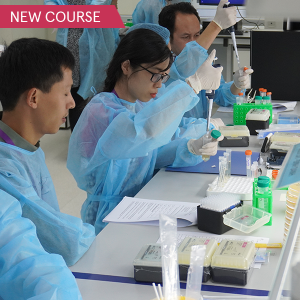NEW COURSE! Bacterial Genomes: Antimicrobial Resistance in Bacterial Pathogens
30 March–1 June 2020
Online, FutureLearn platform
What's antimicrobial resistance and how can we detect it? Explore the clinical relevance of AMR and the methods used to detect it.
Overview
- Duration: 3 weeks, 5 hours per week
- Start Date: The course is run ‘live’ for 3 weeks from the start date above. Once this period is over there will be no live monitoring of the forums, but you can still join and complete the course during the remaining period.
- Free
- Certificate of achievement available on satisfactory completion
AMR is a public health emergency. Global projections predict the loss of nearly 10 million lives and up to $100 trillion lost in global production by 2050. According to the United Nations and the WHO, AMR requires immediate international action.
On this course, you will explore the historical and epidemiological aspects of antibiotics and AMR, and recognise its clinical significance.
You will explore the role of genomics in tackling AMR from research, diagnostic and surveillance perspectives, as well as the principles and practice of AMR Quality Assurance.
What will you achieve?
By the end of the course, you’ll be able to…
- Describe the clinical significance and challenges of AMR
- Describe molecular approaches and techniques for the detection and characterisation of AMR genes
- Identify the resistance profile of bacterial pathogens
- Explain the principles and practice of Quality Assurance and Quality Control in AMR surveillance techniques, antimicrobial susceptibility testing and reporting
- Explore the role of genomics in tackling AMR from a research, diagnostics and surveillance point of view
Who is this course for?
This course is designed for researchers and healthcare professionals interested in infectious diseases, epidemics and the problem of microbial resistance. It will help those with backgrounds in microbiology or bioinformatics to work together.
No prior learning is required, but it is recommended learners with no previous knowledge of AMR take the introductory FutureLearn course, Bacterial Genomes: Disease Outbreaks and AMR.
What do people say about this course?
“I look at tackling antimicrobial resistance as saving humankind”
Professor Sam Kariuki, Director of the Centre for Microbiology Research at KEMRI, Kenya.
Programme
Course start dates
This course is repeated twice a year.
Next start dates:
- September 2020 (exact date TBC)
What topics will you cover?
Week 1
- Introduction to Antimicrobial Resistance and the global health problem
- Mechanisms of resistance
- Evolution and transfer
Week 2
- Bacterial identification
- Antimicrobial susceptibility testing (AST)
- Advanced approaches to AST
- Advanced molecular techniques
Week 3
- Genomic surveillance of AMR
- Genotype to Phenotype
- Mobile genetic elements
- Transmission and evolution
- The future
- Course assessment
- Concluding discussion and reflection
Educators
Lead Educators
Beth Blane
I am a research assistant in the Department of Medicine, University of Cambridge, and a Health and Care Professions Council registered Biomedical Scientist.
Ewan Harrison
I am a microbiologist based at the Wellcome Sanger Institue and the University of Cambridge in the UK. My research focuses on bacterial pathogens and antibiotic resistance.
Francesc Coll
I am a computational biologist with expertise in bacterial genomics and clinical microbiology. I have taught in multiple short courses on microbial genomics and antimicrobial resistance.
Narender Kumar
I am a bioinformatician at the University of Cambridge, UK. I work on detection of drug resistance from the whole genome sequences of bacterial pathogens.
Fahad Khokhar
I am a Research Assistant in the Department of Medicine, University of Cambridge. My research focusses on the diagnostics of bacterial pathogens and AMR genes.

